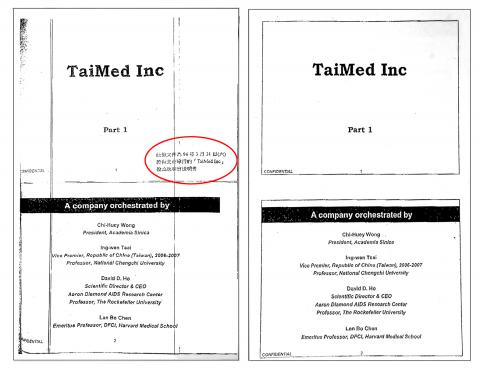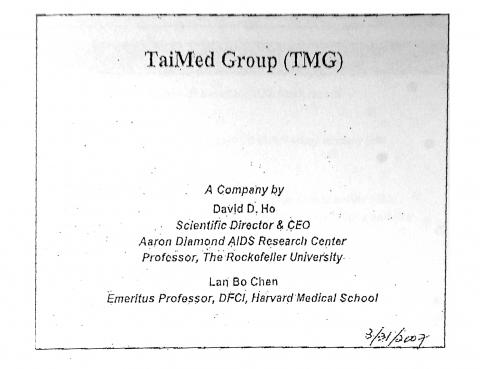The Democratic Progressive Party (DPP) yesterday described the controversy surrounding its presidential candidate Tsai Ing-wen’s (蔡英文) involvement with a biotechnology start-up as “Taiwan’s Watergate scandal,” claiming that administrative and judiciary agencies have been used as campaign tools to benefit the presidential campaign of the Chinese Nationalist Party (KMT).
The accusation came after the Supreme Prosecutors’ Office Special Investigation Division (SID) launched an investigation into the National Development Fund (NDF) on Tuesday night and seized information about three investment deals made between 2005 and 2008, when Tsai served as vice premier.
The DPP accused Council for Economic Planning and Development (CEPD) Minister Christina Liu (劉憶如) of being the KMT’s “hired thug” by fabricating documents to suggest Tsai’s wrongdoings in the formation of and the government’s investment in Yu Chang Biologics Co (宇昌生技股份有限公司).

Photos: Liberty Times
Yesterday afternoon, the DPP filed lawsuits with the Taipei District Prosecutors’ Office against Liu and KMT legislators Chiu Yi (邱毅), Hsieh Kuo-liang (謝國樑) and Lin Yi-shih (林益世), charging them with document forgery and violating the Presidential and Vice Presidential Election and Recall Act (總統副總統選舉罷免法).
The party also condemned what it called the SID’s collaboration with the KMT.
‘WATERGATE’

Photo: Liberty Times
“The case has now become Taiwan’s Watergate, a definite political scandal. We demand that President Ma Ying-jeou (馬英九) and the SID explain why they have resorted to the measure to influence the presidential election,” DPP spokesperson Chen Chi-mai (陳其邁) said.
Liu and the KMT on Monday accused the DPP chairperson of involvement in wrongdoings when they displayed a document that they said was distributed by TaiMed Group, from which Yu Chang Biologics was formed, at an investors’ conference on March 31, 2007, and said the presentation document listed Tsai as one of the principal leaders of the start-up during the time she was vice premier.
However, the document was actually a TaiMed Group presentation from Aug. 19, 2007 — three months after Tsai left office, the DPP said on Tuesday, but the KMT inserted additional information on the document copies provided to the media that indicated it had come from the March investors’ conference.
The DPP demanded a formal apology from Liu and the three KMT lawmakers.
While Liu apologized on Tuesday evening for “confusing the dates” of the document, her refusal to say the document had been fabricated was the reason behind the DPP’s decision to file the lawsuit, Chen said at a press conference.
Liu’s mistake was more than carelessly misstating the date, Chen said, as the document appeared to have been fabricated before Monday because Liu repeatedly said in the press conference that “the March 31 document” was important in determining Tsai’s role in the case.
At the press conference on Tuesday evening in which she ostensibly apologized, Liu said there were what she called “more questionable points” concerning the Yu Chang case, Chen added.
CAMPAIGN TIE-IN
In light of this, the DPP stepped up its claims of the behind-the-scenes political maneuvering by the KMT to benefit its presidential campaign.
“This is a case where the ruling party has exploited state institutions and attacked its opponent with fabricated information,” Chen said.
Citing news reports from various media outlets between Friday last week and Monday, Chen said an unidentified high-ranking KMT official had been quoted as saying that “Tsai could face legal issues if she played a specific role in the case.”
“This seemed to us a sophisticatedly plotted political conspiracy ... We want to identify who the official is and what the KMT’s motive is to politicize this case,” DPP spokesman Chuang Ruei-hsiung (莊瑞雄) said.
“Most people have by now become accustomed to the KMT’s “smear campaign trilogy of so-called whistleblowing, intensive media scrutiny and judicial oppression,” Chuang said.
“But we are surprised that the last part [judiciary oppression] came so quickly,” he said, adding that the SID might even try to summon DPP politicians, including Tsai, former premier Su Tseng-chang (蘇貞昌) and former council chairperson Ho Mei-yueh (何美玥), for questioning before election day.
At a separate setting in the afternoon, Liu confirmed the SID had arrived at the fund’s office a day earlier to retrieve documents related to the Yu Chang Biologics investment case.
The SID has also had access to the documents about two other companies — Taiwan Biopharmaceuticals Co (南華生技) and TaiMed Biotech Fund (台懋生技創投) — that had once applied for funding from the NFD on their “strange” connections with the Yu Chang deal, Liu added.
LIU’S REACTION
When asked for her reaction to being sued by the DPP, Liu said she had to confront it, but added that it was a political move on the DPP’s part.
“The things I have done were part of my responsibilities to the legislature and I have never violated administrative neutrality,” Liu said.
Meanwhile, the DPP yesterday also filed a lawsuit against Tsai Ling-yi (蔡令怡), wife of Premier Wu Den-yih (吳敦義), for allegedly spreading false statements and violating election laws.
At a KMT rally in Penghu on Sunday, Tsai Ling-yi said Tsai Ing-wen had transferred public funds of NT$1.1 billion (US$36.3 million) to the accounts of her family businesses, DPP spokesperson Kang Yu-cheng (康裕成) said.
Those comments violated election laws, which prohibit false statements for the purpose of getting a candidate elected or impeding a person’s election chances, Kang said.
Tsai Ling-yi said last night she “could have cited incorrect information.”
When asked by reporters whether she would apologize for the remark, she said: “If I have used incorrect information, I would apologize.”
Additional reporting by Amy Su

SECURITY: As China is ‘reshaping’ Hong Kong’s population, Taiwan must raise the eligibility threshold for applications from Hong Kongers, Chiu Chui-cheng said When Hong Kong and Macau citizens apply for residency in Taiwan, it would be under a new category that includes a “national security observation period,” Mainland Affairs Council (MAC) Minister Chiu Chui-cheng (邱垂正) said yesterday. President William Lai (賴清德) on March 13 announced 17 strategies to counter China’s aggression toward Taiwan, including incorporating national security considerations into the review process for residency applications from Hong Kong and Macau citizens. The situation in Hong Kong is constantly changing, Chiu said to media yesterday on the sidelines of the Taipei Technology Run hosted by the Taipei Neihu Technology Park Development Association. With

CARROT AND STICK: While unrelenting in its military threats, China attracted nearly 40,000 Taiwanese to over 400 business events last year Nearly 40,000 Taiwanese last year joined industry events in China, such as conferences and trade fairs, supported by the Chinese government, a study showed yesterday, as Beijing ramps up a charm offensive toward Taipei alongside military pressure. China has long taken a carrot-and-stick approach to Taiwan, threatening it with the prospect of military action while reaching out to those it believes are amenable to Beijing’s point of view. Taiwanese security officials are wary of what they see as Beijing’s influence campaigns to sway public opinion after Taipei and Beijing gradually resumed travel links halted by the COVID-19 pandemic, but the scale of

A US Marine Corps regiment equipped with Naval Strike Missiles (NSM) is set to participate in the upcoming Balikatan 25 exercise in the Luzon Strait, marking the system’s first-ever deployment in the Philippines. US and Philippine officials have separately confirmed that the Navy Marine Expeditionary Ship Interdiction System (NMESIS) — the mobile launch platform for the Naval Strike Missile — would take part in the joint exercise. The missiles are being deployed to “a strategic first island chain chokepoint” in the waters between Taiwan proper and the Philippines, US-based Naval News reported. “The Luzon Strait and Bashi Channel represent a critical access

Pope Francis is be laid to rest on Saturday after lying in state for three days in St Peter’s Basilica, where the faithful are expected to flock to pay their respects to history’s first Latin American pontiff. The cardinals met yesterday in the Vatican’s synod hall to chart the next steps before a conclave begins to choose Francis’ successor, as condolences poured in from around the world. According to current norms, the conclave must begin between May 5 and 10. The cardinals set the funeral for Saturday at 10am in St Peter’s Square, to be celebrated by the dean of the College